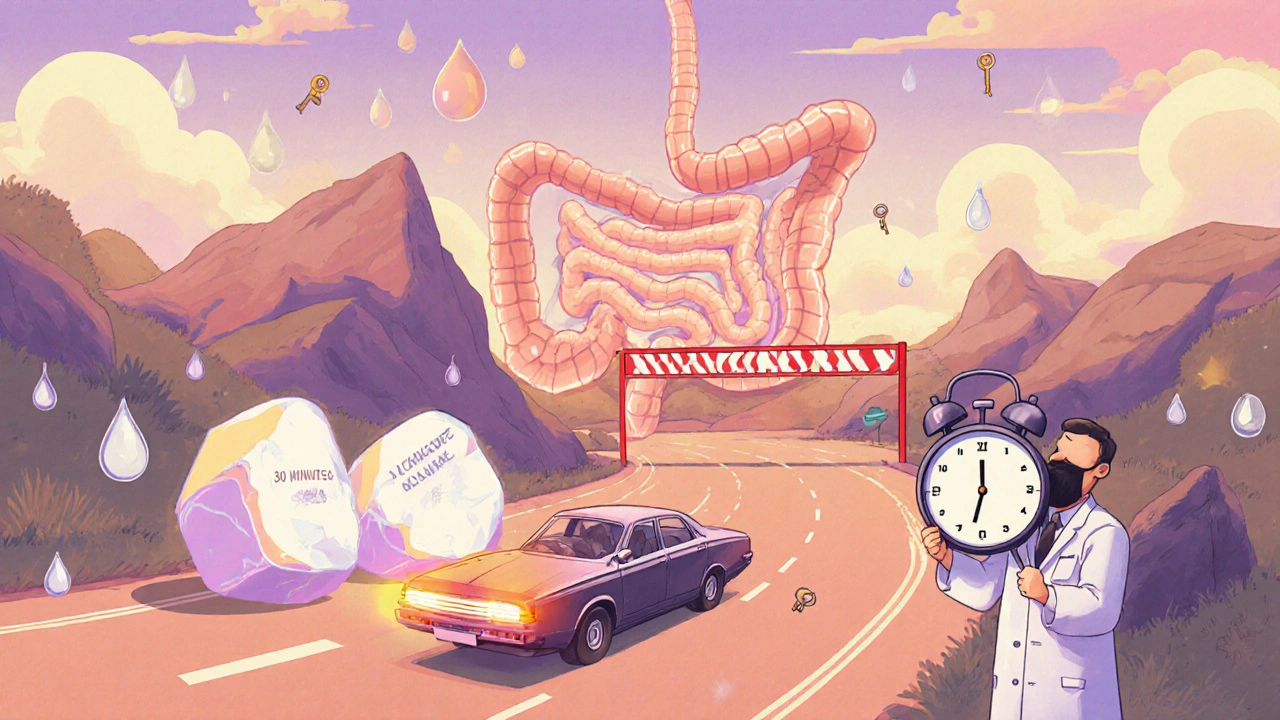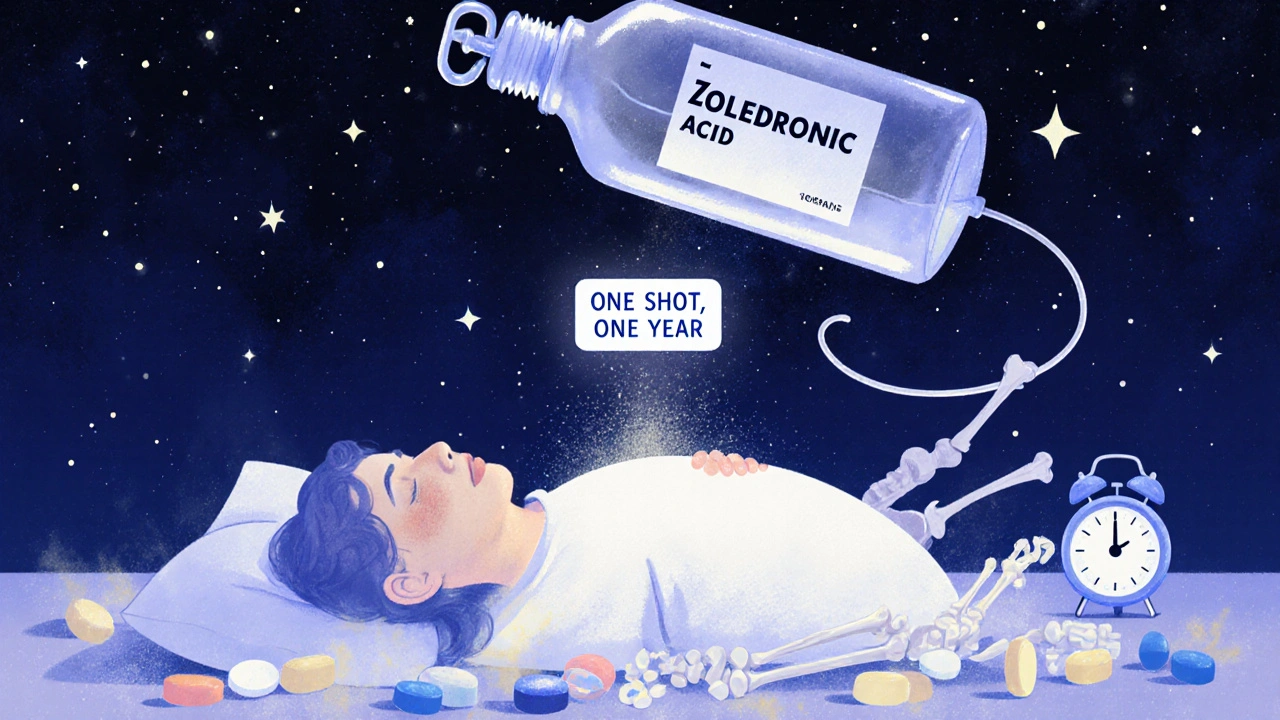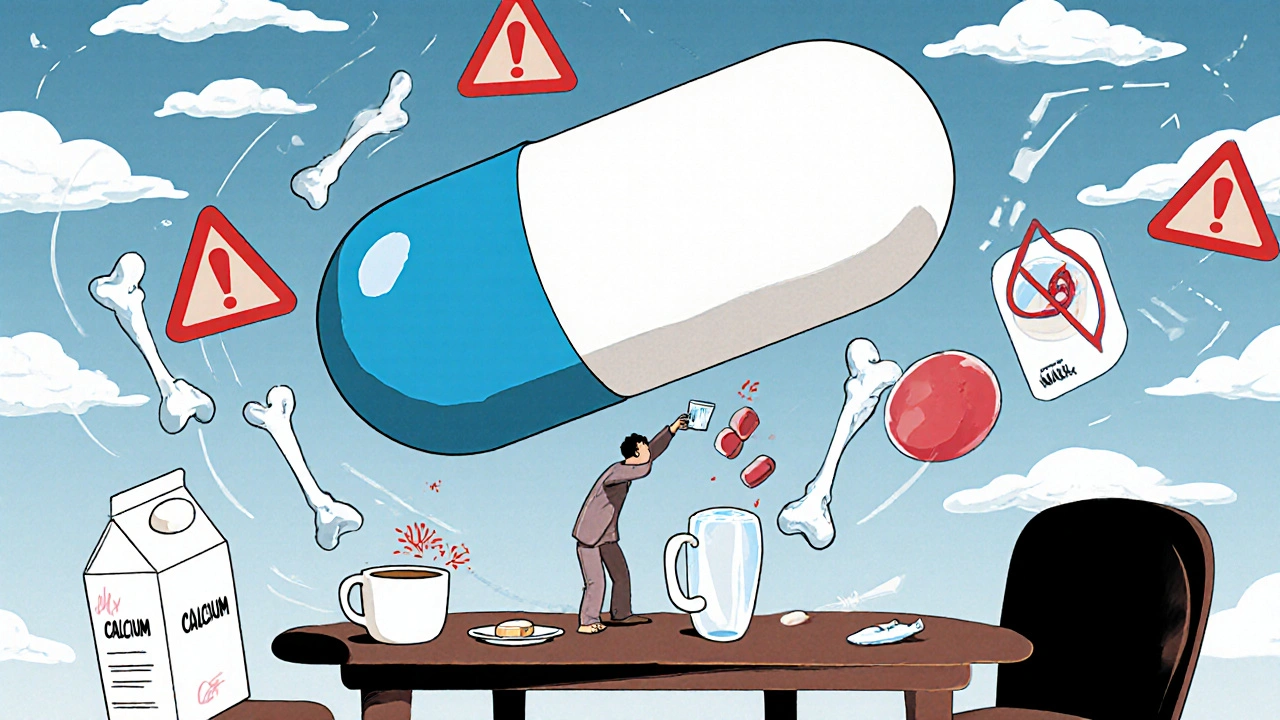Bisphosphonate Timing Calculator
Why Timing Matters
Calcium supplements reduce bisphosphonate absorption by up to 98.7% when taken together. You must take bisphosphonates at least 30 minutes before calcium to ensure maximum effectiveness. This calculator helps you plan your daily schedule.
Your Daily Schedule
Recommended Bisphosphonate Time
Getting the most out of your bisphosphonate for osteoporosis isn’t just about taking the pill. It’s about timing-and what you eat or drink around it. If you’re taking calcium supplements at the same time, you might as well be throwing your medication away. Studies show that calcium can slash bisphosphonate absorption by up to 98.7%. That’s not a small mistake. That’s a treatment failure.
Why Bisphosphonates Are So Picky
Bisphosphonates like alendronate, risedronate, and zoledronic acid are designed to stick to bone. Their chemical structure has two phosphate groups that latch onto calcium in your bones, especially where bone is being broken down and rebuilt. That’s how they work-they slow down bone loss. But that same structure makes them cling to calcium in your gut too. When you take a bisphosphonate with food, milk, antacids, or calcium supplements, the calcium binds to the drug before it can be absorbed. It forms a complex your body can’t use. The result? Less than 1% of the drug enters your bloodstream. That’s why the FDA requires warning labels on every oral bisphosphonate box. It’s not a suggestion. It’s a medical necessity.The Exact Rules for Taking Bisphosphonates
There’s no wiggle room here. If you want the drug to work, you follow the protocol exactly:- Take it first thing in the morning, on an empty stomach-no food, coffee, juice, or even water for at least 8 hours before.
- Swallow it with 6 to 8 ounces of plain water only. No sparkling water. No mineral water. Plain tap water.
- Stay upright-standing or sitting-for at least 30 to 60 minutes after taking it. Lying down increases the risk of the pill irritating your esophagus.
- Wait at least 30 minutes before eating, drinking anything else, or taking any other medication-including calcium, iron, or vitamin D supplements.
Calcium Supplements: The Silent Saboteur
Calcium supplements are essential for bone health. But if you take them at the wrong time, they sabotage your bisphosphonate. Both calcium carbonate and calcium citrate interfere equally. Even if you think you’re being careful, many people accidentally take them together. A 2023 survey of 1,247 patients on the Bone Smart forum found that 68% had accidentally taken calcium within hours of their bisphosphonate. Over 40% reported stomach pain or heartburn afterward-symptoms they blamed on the drug, but were actually caused by the interaction. The fix? Separate them by at least 30 minutes. But here’s the smarter way: make calcium part of your daily routine, and schedule bisphosphonates around it. If you take calcium at breakfast, take your bisphosphonate at 5 a.m. If you take calcium at dinner, take your bisphosphonate at 5 p.m.-but only if you haven’t eaten since noon. That’s tough for most people. So the most practical advice from the Journal of the American Geriatrics Society is this: pick one fixed time for calcium every day, then take your bisphosphonate at least 30 minutes before that time.
What About Vitamin D?
Vitamin D helps your body absorb calcium. But if your vitamin D levels are low, your bones won’t respond well to bisphosphonates-and you might even develop low calcium levels in your blood, which can cause muscle cramps or irregular heartbeat. The Endocrine Society recommends checking your 25-hydroxyvitamin D level before starting bisphosphonates. The target? At least 30 ng/mL. If you’re below that, you’ll need to supplement vitamin D-but not at the same time as your bisphosphonate. Wait at least 30 minutes after taking the bisphosphonate, then take vitamin D with your next meal.Oral vs. IV: The Real Difference
Oral bisphosphonates have terrible absorption-less than 1%. That’s why so many people don’t see results. But intravenous (IV) versions like zoledronic acid (Reclast) go straight into your bloodstream. No stomach. No calcium interference. 100% bioavailability. That’s why IV zoledronic acid is given once a year. No daily pills. No fasting. No waiting 30 minutes before breakfast. Just one 15-minute infusion. In the FRACTURE study, 78% of patients stuck with the yearly shot, compared to only 52% who kept up with daily alendronate. If you’re struggling with timing, or you’ve missed doses because of the strict rules, talk to your doctor about switching to IV. It’s not just easier-it’s more effective for people who can’t manage the daily routine.What If You Messed Up?
You forgot to wait. You took your calcium with your pill. You lay down right after. Don’t panic. Don’t double up next time. Just skip that dose. Wait until tomorrow. Take it on an empty stomach, with plain water, and stay upright. One missed dose won’t ruin your treatment. But doing it wrong every day? That will. A 2022 study from the National Osteoporosis Foundation found that half of patients who failed to respond to bisphosphonates weren’t non-compliant-they were just doing it wrong. The drug works. But only if you follow the rules.
What’s New? Better Options Coming
Researchers are working on ways to fix this. Radius Health’s experimental drug, RAY121, uses a special additive to boost absorption-raising it from under 1% to over 15%. That’s a 1,500% improvement. It’s still in trials, but if it gets approved, it could change everything. Other companies are testing pills that separate calcium and bisphosphonate into different layers, releasing them at different times. For now, though, the best solution is still timing, education, and sometimes switching to IV.Real People, Real Fixes
One Reddit user, u/OsteoWarrior, shared how they solved it: “I set my alarm for 5 a.m. I take the pill, drink water, sit in my chair, and read the paper for an hour. Then I eat breakfast with my calcium. It’s annoying at first, but now it’s just part of my routine. I haven’t missed a dose in 18 months.” Another patient, in her 70s, switched to yearly zoledronic acid after years of stomach issues. “I used to hate mornings,” she said. “Now I just go in for a quick infusion and forget about it until next year.”Bottom Line: Timing Is Everything
Bisphosphonates are powerful. But they’re also finicky. Calcium supplements aren’t the enemy-they’re necessary. But they have to be scheduled like a meeting, not an afterthought. If you’re on a bisphosphonate:- Take it first thing in the morning, on an empty stomach.
- Only drink plain water with it.
- Stay upright for at least 30 minutes.
- Wait at least 30 minutes before taking calcium, iron, or antacids.
- If you’re struggling, ask your doctor about IV zoledronic acid.
Don’t let a simple timing error cost you your bone health. Get it right-and your bones will thank you.
Can I take calcium and bisphosphonates together if I wait a few hours?
No. Even waiting a few hours isn’t enough. The drug binds to calcium in your gut almost immediately. The only safe approach is to take bisphosphonates on an empty stomach, wait at least 30 minutes, and then take calcium with food. The 30-minute rule is the minimum. Waiting longer-like 2 hours-is even safer.
What if I forget and take them together? Should I take another dose?
Don’t take another dose. Taking extra can irritate your stomach and raise your risk of side effects like esophagitis. Instead, skip that dose and resume your regular schedule the next day. Missing one dose won’t undo your treatment. Doing it wrong repeatedly will.
Is calcium citrate better than calcium carbonate for avoiding interference?
Calcium citrate is absorbed better on an empty stomach and may be easier on your gut, but it interferes with bisphosphonates just as much as calcium carbonate. The type of calcium doesn’t matter-only the timing. Both forms bind to bisphosphonates in the gut and block absorption. Always separate them by at least 30 minutes.
Can I take vitamin D with my bisphosphonate?
No. Vitamin D supplements should be taken at least 30 minutes after your bisphosphonate, preferably with food. While vitamin D doesn’t bind to bisphosphonates like calcium does, taking them together can still reduce absorption. Plus, vitamin D works best when taken with a meal. Wait until after your 30-minute fasting window.
Why do some people still get results even if they don’t follow the rules?
Some people may still see minor benefits because bisphosphonates have a long half-life in bone tissue-up to 10 years. Even small amounts absorbed over time can accumulate. But this doesn’t mean the treatment is working as intended. Studies show patients who follow the rules have 2-3 times better fracture prevention than those who don’t. You’re gambling with your bone strength if you skip the protocol.
Are there alternatives to bisphosphonates if I can’t follow the timing rules?
Yes. If timing is too difficult, talk to your doctor about alternatives like denosumab (Prolia), which is given as a twice-yearly injection, or zoledronic acid (Reclast), given once a year intravenously. Both bypass the gut entirely, so calcium timing isn’t an issue. There’s also romosozumab (Evenity), a monthly injection that builds new bone-but it’s more expensive and not for everyone. Your doctor can help you choose based on your health, cost, and lifestyle.


Comments (11)
joe balak
Just took mine with coffee. Guess I'm doing it wrong.
John Rendek
Don't beat yourself up. One mistake doesn't ruin everything. Just reset tomorrow with plain water and stay upright. Consistency beats perfection every time.
Ryan Tanner
Same here. I used to take mine with my morning smoothie. Then I started setting an alarm for 5 a.m., chugged water, sat in my chair reading the news for an hour. Now it's just part of my routine. No more stomach issues. 🙌
Emily Barfield
...and yet, we are told to trust pharmaceutical giants who design drugs that require near-monastic discipline to function... while simultaneously pushing supplements that actively sabotage them... is this not a systemic failure? A design flaw masked as patient error? The body is not a machine to be bolted together with pills and schedules-it is a living, breathing, *adaptive* system... and we are punishing it for not obeying arbitrary rules written by people who’ve never felt the ache of osteoporosis... or the dread of swallowing a pill on an empty stomach at dawn...
...and what of the elderly? The chronically ill? The ones who forget? Who can’t sit upright for 30 minutes? Who live alone? Are they simply ‘non-compliant’... or are they victims of a system that demands perfection from those least able to deliver it?
...and if the drug only works when taken with plain water... why isn’t there a pill that doesn’t need it? Why is the burden always on the patient? Not the manufacturer? Not the FDA? Not the medical establishment that sells this as ‘standard care’?
...I’m not saying don’t take it. I’m saying... we’ve built a world where healing requires sacrifice... and we call that ‘medicine’.
Jessica Adelle
It is unconscionable that patients are left to navigate such a complex and potentially dangerous regimen without adequate support. The pharmaceutical industry, in conjunction with regulatory bodies, has failed to provide accessible alternatives or simplified protocols. This is not patient negligence-it is institutional negligence. One must adhere to a schedule more rigid than military protocol, and if one falters, the consequences are severe. This is not healthcare. This is punishment dressed as prevention.
Cornelle Camberos
Notice how no one talks about the fact that the FDA only mandated these warnings after lawsuits piled up. The drug makers knew. They knew calcium blocked absorption. They knew patients would mess it up. They still sold it as a daily pill. Why? Because IV versions are 10x more profitable. This isn't about your bones. It's about profit margins. They want you dependent on yearly infusions. Don't be fooled.
Amina Kmiha
Y'all are missing the real plot twist. 😏 The FDA didn't require the warning because of science. They did it because Big Pharma paid them to scare people into taking the IV version. Look at the stock prices of Reclast manufacturers after the labeling changes. Boom. 💸 And now they're pushing RAY121 like it's the second coming. Same game. Different pill. Wake up.
Iván Maceda
Same. Took mine with milk once. Felt like a knife in my throat for 3 days. 😣 Now I do 5 a.m. water + 30 min wait. No more pain. No more guilt. Just peace. 🙏
Sonia Festa
so like... i take my calcium with my eggs at 8am, right? so i just set my alarm for 5am, chug water, sit like a statue, and then go back to bed? sounds like a whole vibe. i’m not a morning person, i’m a ‘i-just-want-to-live’ person. why is this so hard? 🤡
Vrinda Bali
It is a well-known fact that Western medicine relies on such rigid protocols to maintain control over the patient population. In traditional Indian systems, bone health is restored through diet, sunlight, and movement-not chemical interventions forced upon the body at precise times. This entire regimen feels like an artificial construct designed to generate revenue, not healing. One must question the motives behind such a complex and anxiety-inducing treatment plan.
Sara Allen
okay but like… what if you’re just… tired? what if you’re 72 and your back hurts and you just want to lie down after taking your pill? why is everyone acting like it’s so easy? i missed my dose like 4 times last week and i cried because i thought i was gonna break a bone and now my doctor keeps giving me that look like i’m dumb. i’m not dumb. i just want to sleep. 🤬